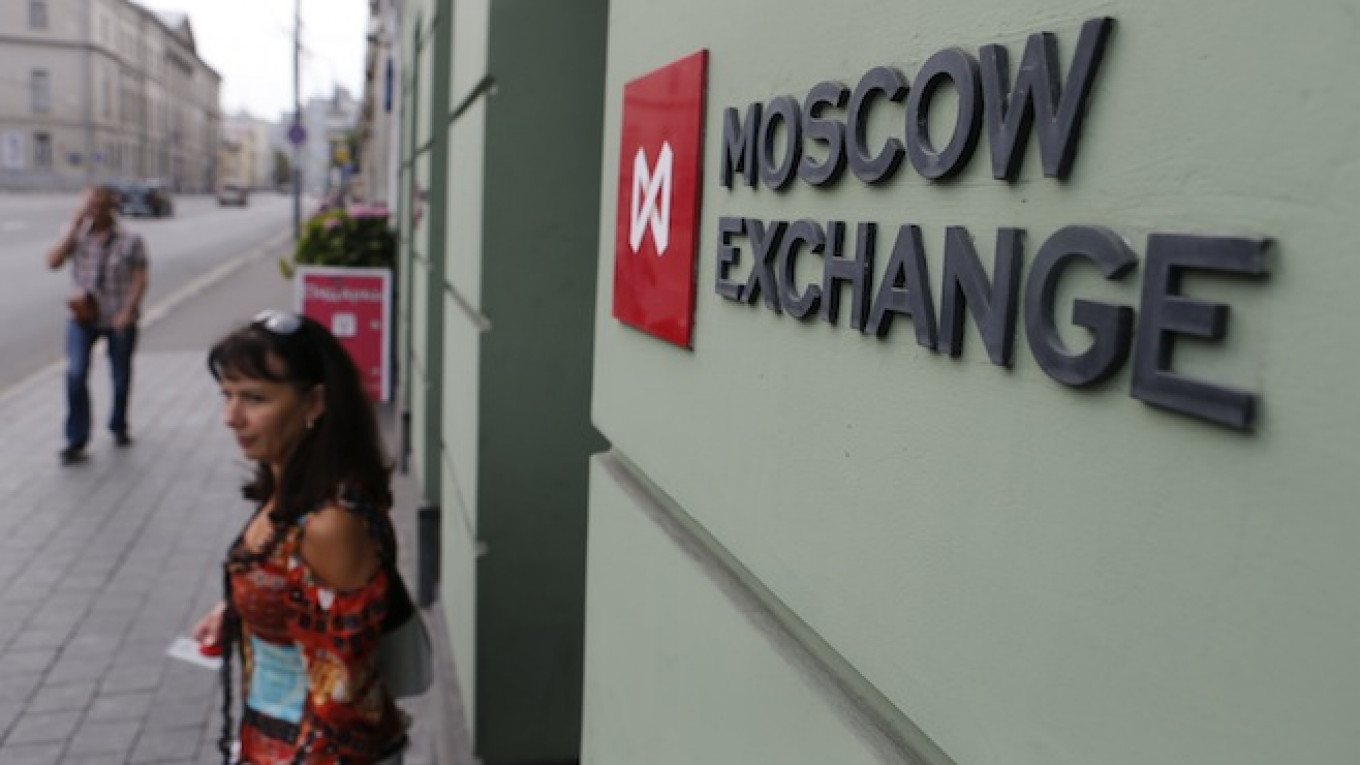LONDON — Mathematically Russia has enough reserves to hold out for at least two years before Western sanctions start to choke the economy, but it must avoid reawakening the "sleeping dragon" of investor panic.
At first glance, the stockpile — $472 billion of hard currency reserves and nearly $1.5 trillion of assets overall — is more than enough to keep banks, firms and the economy going as the West tries to punish Moscow over the Ukrainian crisis.
But this ignores the psychological effect. Russia burned through $200 billion in six months during its last major crisis in 2008-09; if reserves were to start draining away again, panic could quickly set in among people inside and outside the country, accelerating a flight of capital.
The United States and European Union first imposed sanctions after Russia annexed Crimea from Ukraine in March and have since tightened them significantly. This week, the EU froze five state-controlled banks out of its capital markets in measures targeted at Russia's financial, military and energy industries.
While Russia is on the verge of recession, analysts and investors generally agree with Russian officials when they say that its finances can withstand a tightening of the screws for now.
"They have reserves of almost half a trillion dollars. Given the minimal refinancing needs of the sanctioned banks, they're in a reasonably comfortable position," said Brett Diment, head of emerging markets funds for Aberdeen Asset Management.
Those needs are in the range of $7-8 billion in the next year, and the Central Bank has said it will support any domestic bank hit by the sanctions.
Analysts at Morgan Stanley calculate that the reserves, which are the fifth largest in the world, could cover all maturing external debt three times over and imports for around 17 months. That's much longer than the six months threshold, below which alarm bells usually start ringing with emerging economies.
Reuters calculations based on Central Bank data show that big Russian banks must refinance around $50 billion of debt this year and next, while companies' needs are closer to $100 billion.
This seems manageable, but many factors are not clear-cut. About a third of the reserves are in two oil wealth funds earmarked for countering drops in international oil prices rather than funding banks or firms. Roughly $40 billion is in gold, while $13 billion is parked at the IMF, official data show.
Russia also needs to keep income flowing from energy exports. While the EU sanctions target European exports of equipment to the Russian oil industry, those for gas production are exempt. This underlines a basic interdependence: Europe needs Russian gas, just as Russia needs the money it earns.
Waking the Dragon
Nevertheless, most Russia experts believe the sanctions are likely to get tougher in the next few months. Neither side appears ready to back down in the crisis, which deepened after a Malaysian airliner was brought down over territory in eastern Ukraine controlled by pro-Moscow rebels last month.
At the very least, the number of banks and firms needing help as they are hit by sanctions is likely to grow.
One of the biggest unknowns is how many foreign investors and Russians will move their money out of the country if relations with the West, and the economy, sour further.
Russia was badly hurt during the global financial crisis six years ago, with capital fleeing abroad and the Central Bank burning rapidly through its reserves as it tried to slow a one-third drop in the ruble's value against the dollar.
Recent Central Bank data have shown Russians again ditching the ruble for dollars and other foreign assets, at the fastest pace in more than four years.
Around $75 billion poured out of Russia in the first six months of this year and Morgan Stanley expects a similar amount will leave in the second half. One economist said the question was whether "the sleeping dragon of demand for dollars and other foreign assets would be woken up again," adding that it probably would be to a certain extent.
While the Central Bank managed the ruble's slide during the last economic crisis, it might react differently if the current geopolitical confrontation worsens.
Timothy Ash, head emerging markets strategist at Standard Bank in London, said that the Central Bank may try to hold the line if capital flight accelerates.
"Once that starts, reserves would melt pretty quickly, and I think that unlike in 2008-09 the Central Bank would be loath to let the currency weaken amid geopolitical risks," he said.
The authorities could reimpose capital controls, but earlier in the crisis the Central Bank made clear it opposed such action, which would reduce Russians' demand for foreign currency but also raise borrowing costs for corporations.
While it is difficult to judge what everyday Russians would do, the exodus of investors may not turn into the stampede some fear. Foreigners hold almost $200 billion of Russian equities, according to the Central Bank. But with many emerging market funds benchmarked to indexes such as MSCI's, where Russian stocks account for around 5 percent, it means they cannot pull all their money out.
Plus Point
Another plus point is that with $1.47 trillion in total assets — reserves plus those held both at home and abroad by Russians — versus $1.34 trillion of liabilities, Moscow's finances are in the black.
The biggest difference between now and the 2008-09 crisis is that this time the oil price, which brings in much of Russia's wealth, is not suffering from a global financial crisis.
However, Moody's rating agency warned on Thursday that the current turbulence could leave Russia exposed if oil prices were to fall sharply after all. "If capital outflows continued at a similar pace as in the first half of 2014 because of the Ukraine conflict and sanctions, the level of reserves with which Russia would face an oil shock would be significantly lower than in 2008," Moody's said in a report.
But for now, while the situation remains unpredictable, the better global economic environment than in 2008-09 should mean Russia's finances deteriorate at least at a slower pace.
"If the corporates and banks lose access [to capital markets] you will have to keep an eye on the currency reserves because they would have to rely on the Russian Central Bank to provide the dollars to fund their external debt," said Viktor Szabo, a Russian specialist that works alongside Diment at Aberdeen Asset Management. "But it is not a short-term issue, it is more of a 2 to 3 year horizon."
See also:
Asia No Answer to Russian Companies' Capital Crisis
Russia's Central Bank Vows to Support Sanctioned State Banks
A Message from The Moscow Times:
Dear readers,
We are facing unprecedented challenges. Russia's Prosecutor General's Office has designated The Moscow Times as an "undesirable" organization, criminalizing our work and putting our staff at risk of prosecution. This follows our earlier unjust labeling as a "foreign agent."
These actions are direct attempts to silence independent journalism in Russia. The authorities claim our work "discredits the decisions of the Russian leadership." We see things differently: we strive to provide accurate, unbiased reporting on Russia.
We, the journalists of The Moscow Times, refuse to be silenced. But to continue our work, we need your help.
Your support, no matter how small, makes a world of difference. If you can, please support us monthly starting from just $2. It's quick to set up, and every contribution makes a significant impact.
By supporting The Moscow Times, you're defending open, independent journalism in the face of repression. Thank you for standing with us.
Remind me later.






